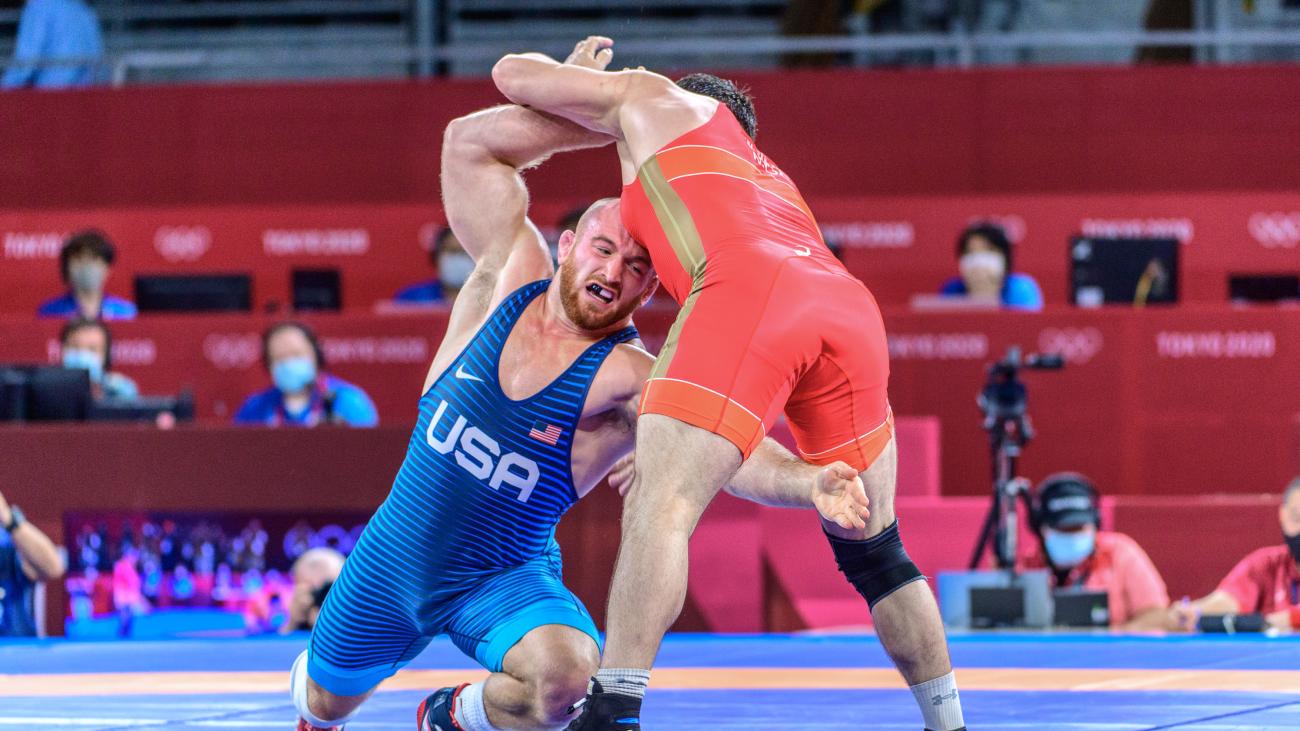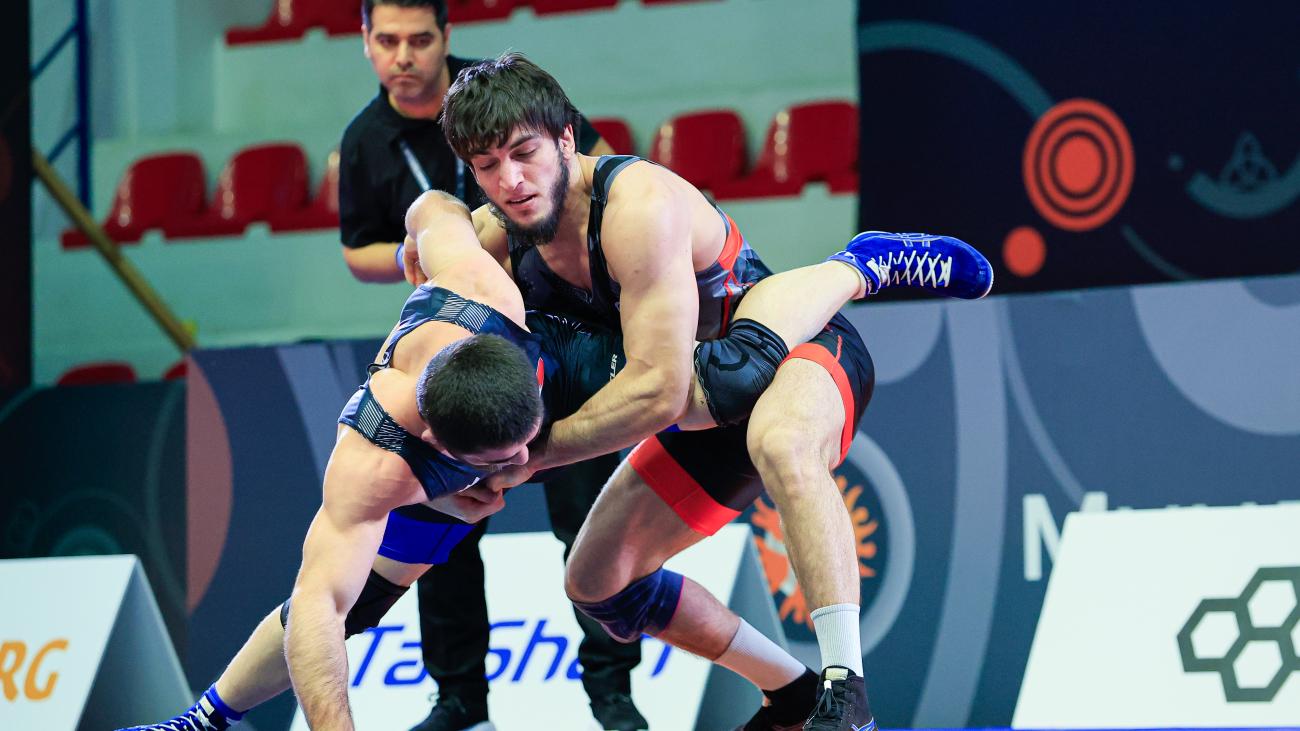Tatsuhiro Yonemitsu
Style: Men's Freestyle
Date of birth: 05/08/1986
Born: Nirasaki, Japan
Weight: 66kg
A Prodigy Fulfills His Potential
Every few years the sport of wrestling welcomes a prodigy to the mat. Some athletes seem destined for greatness; they appear as if they have designed for the exact purpose of winning wrestling matches.
A wrestling prodigy possesses unmatched grace and power, and a keen mind which understands the sport intuitively. Every wrestling coach dreams of the day when they will discover a prodigy to teach and to groom, and only a select few will ever have such good fortune in their lifetime.
Tatsuhiro Yonemitsu is a true wrestling prodigy.
A judoka when he was younger, Yonemitsu did not start wrestling until the age of 14, older than many of his elite competitors. Four years after starting , he placed in the top three in his weight class at Japan's national champion, competing against, and beating, grown men with world-class wrestling skills.
Yoenmitsu is rare physical specimen. He’s flexible, strong and has incredible length in his arms. IN fact, his arm span measures longer than his height and as a young man he could clasp his hands together and use his arms as a jump rope. As a wrestler, having long arms has always meant his opponent's legs are always within his reach.
Before Yonemitsu wrestled, he practiced the martial art of judo. While participating in a middle school judo tournament, he caught the eye of Toshiro Fumita, a high school wrestling coach from Yonemitsu's home town of Nirasaki. Yonemitsu's judo skills wowed Fumita, but Fumita immediately knew the Yonemitsu's true potential was on the wrestling mats.
Fumita approached the young man and gave him his honest assessment of his potential in the sport of wrestling.
""You're a talented wrestler and could go to the Olympics."" Fumita informed Yonemitsu.
Yonemitsu joined Fumita's team at Nirasaki Technical High School. An enthusiast of martial-arts pioneer and superstar Bruce Lee, Yonemitsu wanted to become a strong and heroic fighter, and he saw wrestling as a means to this end. He was a natural on the mats and after his high school career went to wrestle for the club at Takushoku University, which along with Nippon Sports Science University and Yamanashi Gakuin University, occupies a spot as one of Japan's top three institutions in university wrestling. Yonemitsu flourished under the watchful eye of Takushoku’s coach, two-time Olympian Shigeki Nishiguchi. Yonemitsu won repeated national university championships, and established himself as the top college wrestler in all of Japan.
In 2008 he won his first major international title, a gold medal at the University World Championships in Greece.
After graduating from Takushoku, Yonemitsu joined the Japanese defense forces, and continued his ascent to the top of the wrestling world. In 2009, he won a silver medal in the Asian championships, losing only to Iranian star Mehdi Taghavi. That year Yonemitsu would earn his first world-level medal, a bronze at the Senior World Championships in Denmark, beating India's Sushil Kumar to make the podium.
At his next two major tournaments, Yonemitsu would once again find Iran's Taghavi standing in the path to a gold medal.
Yonemitsu was able to overcome his foe to win the Asian Games in 2010, but in 2011, Taghavi defeated Yonemitsu. At the 2011 Senior World Championships in Turkey, Yonemitsu faced Taghavi in the gold medal finals, where he would lose a heart-breaking match in straight periods.
Yonemitsu would again defeat Taghavi in a match at the 2012 Freestyle World Cup in Baku, Azerbaijan, but this win only served as a minor consolation. Despite all he had accomplished, and despite competing in the best form of his career heading into the 2012 London Games, Yonemitsu appeared on Japanese television and expressed disappointment with his performance in international competition. Yonemitsu had never won a world-level gold medal; he knew he had not fulfilled his own prodigious potential.
To find a new direction, Yonemitsu took to reading books on combat philosophy written by Japanese masters to prepare his mind for his battles that awaited. When he arrived at the 2012 Summer Olympics, he was intent on taking wrestling's greatest prize.
Whether it was his new reading, or his consistent training, once in London, nothing could stop Yonemitsu. On his way to the 66 kg finals the Japanese wrestler defeated Azerbaijani world medalist Jabrail Hasanov, and avenged a prior defeat against Cuban stand out Livan Lopez.
In the Olympic finals, Yonemitsu faced India’s Sushil Kumar. Though he had beaten the Indian the last time they met, Kumar had won something Yonemitsu never had since their previous meeting: a world championship. Yonemitsu paid no heed to the Indian's past credentials, and world champion or not, Kumar proved little trouble for Yonemitsu; the Japanese wrestler won in straight periods, dramatically lifting his opponent off the mat and throwing him across his back for the winning takedown in the second period.
Yonemitsu had his Olympic gold, the first Japanese men's freestyle wrestler to earn this distinction since Mitsuru Sato at the 1988 Seoul Games. His massive promise as an athlete finally fulfilled, Yonemitsu expressed joy in his triumph.
""It happened all of a sudden, so I can't think how important it was,"" Yonemitsu said, basking in the glow of his newly won Olympic gold. ""For Japanese men's wrestling, I think I have made a big contribution so I am very happy.""
Yonemitsu was not alone celebrating his Olympic championship in London. Fumita, his high school coach, the man who first identified the unparalleled potential in Yonemitsu, sat watching in the crowd. Fumita, who had been there from the beginning, could fully appreciate what his young protégé accomplished.
""He was aiming to conquer the world from the start,"" said Fumita when asked about Yonemitsu's Olympic victory. ""It used to be just big talk, but now he's really become top of the world.”
“He's amazing.""





